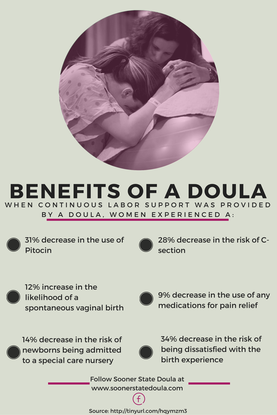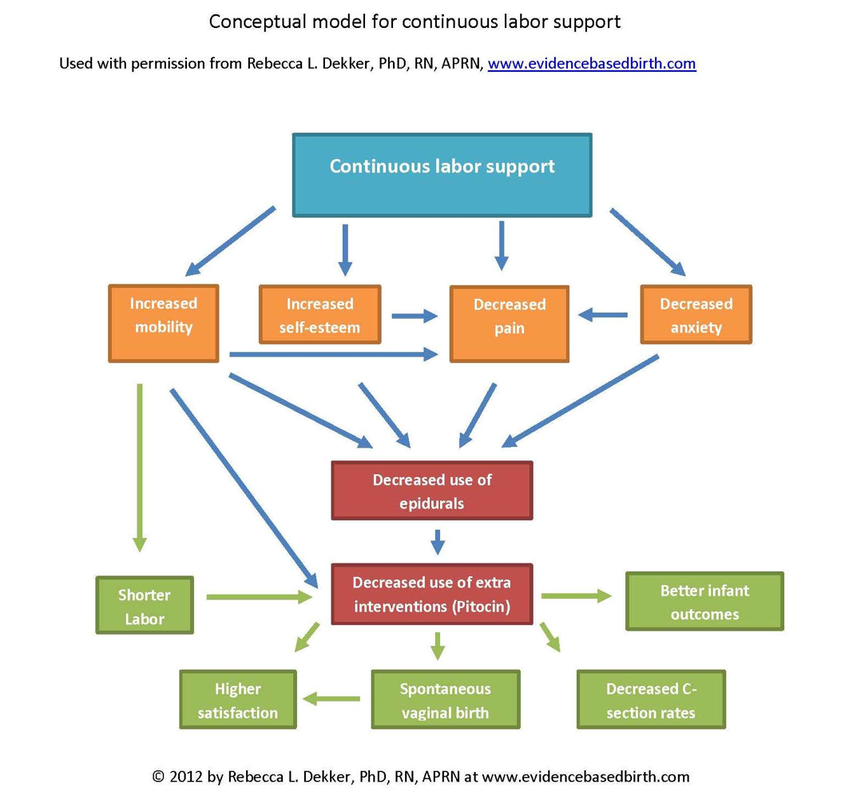 Women have complex needs during childbirth and the weeks that follow. In addition to medical care and the love and companionship provided by their partners, women need consistent, continuous reassurance, comfort, encouragement and respect. They need individualized care based on their circumstances and preferences. For the majority of birthing women, these needs are not met. Most women today birth in the hospital where they are attended by nurse. The nurse meets the couple that day, typically knowing little to nothing about their birthing wishes, goals and past. The nurse is attending many other couples as well, and may go off the clock during your birth, meaning you will get a new nurse and have to start forming a relationship all over again. Doulas can fill this gap that is missing in modern birth but they are only utilized by 3% of birthing women! When continuous labor support was provided by a doula, women experienced a: 31% decrease in the use of Pitocin 28% decrease in the risk of C-section 12% increase in the likelihood of a spontaneous vaginal birth 9% decrease in the use of any medications for pain relief 14% decrease in the risk of newborns being admitted to a special care nursery 34% decrease in the risk of being dissatisfied with the birth experience 25% decrease in length of labor 40% decrease in forceps deliveries 60% decrease in use of epidural pain medication Reduced incidences of maternal fever Reduced the amount of septic workups performed on newborns Resulted in higher rates of breastfeeding Resulted in more positive maternal assessments of maternal confidence Resulted in more positive maternal assessments of maternal and newborn health Resulted in decreased rates of postpartum depression Why are doulas so effective? There are 3 main reasons why we think doulas are so effective. The first reason is the “harsh environment” theory. In most developed countries, ever since birth moved out of the home and into the hospital, women have been giving birth in conditions that can often be described as harsh. In the hospital, laboring women are frequently submitted to institutional routines, high intervention rates, personnel who are strangers, lack of privacy, bright lighting, and needles. Most of us would have a hard time dealing with these conditions when we’re feeling our best. But women in labor to deal with these harsh conditions when they are in their most vulnerable state. These harsh conditions may slow down a woman’s labor and decrease the woman’s self-confidence. It is thought that a doula “buffers” this harsh environment by providing continuous support and companionship which promotes the mother’s self-esteem. The third reason that doulas are effective is because doulas are a form of pain relief. With continuous support, women are less likely to request epidurals or pain medication. Why are women with doulas less likely to request pain medications? Well, women are less likely to request pain medications when they have a doula because they just don’t need an epidural as much! Women who have a doula are statistically more likely to feel less pain when a doula is present. Furthermore, by avoiding epidural anesthesia, women may avoid many medical interventions that often go along with an epidural, including Pitocin augmentation and continuous electronic fetal monitoring. Hodnett, E. D. (2002). “Pain and women’s satisfaction with the experience of childbirth: a systematic review.” Am J Obstet Gynecol 186(5 Suppl Nature): S160-172.
Hodnett, E. D., S. Gates, et al. (2012). “Continuous support for women during childbirth.” Cochrane database of systematic reviews: CD003766. Hofmeyr, G. J., V. C. Nikodem, et al. (1991). “Companionship to modify the clinical birth environment: effects on progress and perceptions of labour, and breastfeeding.” British journal of obstetrics and gynaecology 98(8): 756-764.
1 Comment
 Today (March 22nd) is world doula day and the start of World Doula Week! What is World Doula Week? The purpose of World Doula Week ("WDW") is to empower doulas all over the world to improve the physiological, social, emotional, and psychological health of women, newborns and families in birth and in the postpartum period. The World Doula Week events will take place all over the world during the same week, stating the benefits of the presence of doulas in birth and in the postpartum period: * Reduces the incidence of c-sections * May shorten the length of labor * Reduces epidural and analgesic requests * Increases breastfeeding initiation and continuation * Increases mother’s satisfaction of birth experience * Can reduce the incidence of postpartum mood disorders * Increases new parents’ confidence in the care of their newborn When is World Doula Week? World Doula Week begins with World Doula Day on March 22nd and will go through March 28th annually. March 22 was chosen because it is the spring equinox, which represents the return of fertility in countless cultures. I am so excited to announce I will hosting a free childbirth class at the Norman Public Library Central! It will be Saturday May 14th 1:30-4:30 PM in room A/B. I am partnering with some lactation consultants and midwives in the metro area to bring Norman a fantastic FREE class covering all aspects of childbirth. Participants are welcome to bring along one support person who will learn how best to support their laboring partner. Spots are limited! If you would like to attend please register by calling 405-928-1967 or emailing me at [email protected]!
|
Miranda JonesMiranda is a birth and postpartum doula serving the central Oklahoma area. Archives
January 2020
Categories
All
|
Proudly powered by Weebly



 RSS Feed
RSS Feed